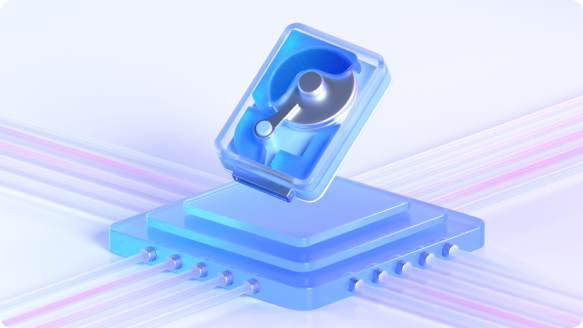How to Fix Non System Disk Error or Disk Error in Windows 10/8/7
Q: How to fix nonsystem disk error or disk error in Windows 10/8/7?
"Today an error message showed up on my screen stating a 'nonsystem disk or disk error' when booting my computer. May I know what are the possible causes of this particular error? Also, are there any methods to get read rid of this message?"
Users often encounter various errors when booting their computers and attempting to access the operating system. A common issue is the "non-system disk or disk error," which indicates that the OS cannot be accessed. If you are facing this problem, there's no need to worry. Solutions are available for both laptops and desktops.
The good news is that below is a guide on how you can fix these errors. With the four solutions, you can choose the most appropriate for your computer. They include both general and advanced troubleshooting fixes.
Part 1: The Possible Reasons for the Disk Error in Your Windows 10/8/7
The reasons that some Dell users get the nonsystem disk or disk error when booting the PC varies. Although users have their reasons why such errors keep happening, Microsoft also gives its own. According to Microsoft is that if start devices such as hard disk drive, floppy disk drive, or CD-ROM drive do not have boot files, the error will show.
Here are more reasons why users encounter these errors.
1. Booting Your Computer from a Media Without Boot Files
If the drive connected to the computer does not have boot files, the non-system disk or disk error will show. The drive could also be having other issues leading to the error.
2. A Faulty/loose SATA or IDE Cable on Your HDD
Your hard disk is connected to the motherboard using SATA/IDE cables. If they are faulty, you will experience this error. If the HDD is not configured to be the first medium your PC boots from, the error will be obvious. The loading process is also caused by old or faulty hard drive data.
3. Incorrect BIOS Settings
The incorrect order of boot devices in BIOS causes this error most. The boot device order is what BIOS uses to find a bootable drive. If a floppy drive is connected to a computer and is set priority is higher than that of a hard drive, when the computer tries to boot from it, this error will occur.
4. The Corrupted Boot Configuration in Your Hard Drive
The nonsystem disk error occurs when the BCD or MBR which are boot sectors are corrupted. Using Windows system repair disc or Windows Installation disk, this error can be fixed. Power outages, read/write errors, and virus attacks also lead to inaccessibility or damage of a hard drive. To make sure the hard disk functions properly, it should be checked and scanned for viruses.
The most important thing is to understand what causes these errors. It is the only way that you can find the appropriate solution.
Read More: How to Fix CD-Rom Not Working in Windows
Part 2: How to Fix Non-System Disk Error or Disk Error in Windows 10/8/7?
There are four basic approaches to fix these errors. In case you experience these issues during Windows startup or installation, you can solve the stop and setup errors.
1. By Removing All Non-System Disks
The first thing that you need to do is to remove the non-system disk from the boot device. It could be a CD, a DVD, floppy disks, and USB flash drives. This is because the boot order could be changed. A good example is to remove the disk from a CD-ROM drive or a floppy drive.
The DVD/CD drive on your computer should be empty the same as the floppy drive if any. You should also make sure that there is no USB flash drive inserted to the PC.
To check whether the problem has been resolved, restart the computer. If the issue persists, you can use the below solution to fix it.
2. By Confirming the Boot Sequence
To check whether the disk with the boot files is at the top of the boot order, enter BIOS. If it is not, you don’t have to worry about it as it is easy to change the boot order sequence.
Start by changing the PC’s setup. Once this is done, change the option, which determines the device that the PC uses to start from. You must select the device that has operating system files or boot files installed.
The reason the computer is failing is that it is booting from a file that does not have an OS. This can be fixed by setting the hard disk in the Boot order as the top priority. Here are simple steps to do this.
Step 1. Once you start your computer press Delete, F1 or F2 repeatedly. This should be before the error or boot screen shows up. The key to press here depends on the computer’s manufacturer. This will take you to the BIOS setup.

Step 2. In this step, you are already in the BIOS setup. Thus, from the list options, select the "Boot" tab.

Step 3. Confirm that the SSD or hard disk in the computer is set as a priority in the Boot order. If it is not, you can set it up within no time. The up and down arrow keys will help you set the hard disk as the top priority. With this done, your PC will boot from this particular source rather than any other.
Step 4. To save the changes that you just made, press F10. Then exit.
Completing step 4 should fix the nonsystem disk or disk error Windows 7.
3. By Removing and Reinstalling the Hard Drive
A jarred computer or one that has been dropped to the floor could bring issues. The connection between the computer and the hard drive is affected. To check if this the case, you should remove the hard drive and reinstall it. Below are steps on how to fix nonsystem disk error.
Step 1. Start by disconnecting the computer from power. Laptop users can remove their battery.
Step 2. Next, you should remove the system disk.
Step 3. Install the system disk.
Step 4. The final step involves powering the computer. If it is a laptop, reinstall the battery
Note: The problem could either be the computer or the hard drive. To confirm the source of the issue, if you have another PC, you should insert this drive there.
4. By Performing Startup Repair
The nonsystem disk or disk error can be fixed with Startup Repair. Before you start the process, remove the external devices that could be connected to the computer. Next, insert a Windows installation disk. Once this is done, following the below steps will help in fixing the problem.
Step 1. Enter BIOS and from the installation disc, set the computer to boot.
Step 2. Give it time for Windows to load files. A Windows interface will show once files are loaded. If you are using Windows 7, the interface will show "Install Windows," while for Windows 10, it will show "Windows setup."

Step 3. Now, here you can see a link that reads - "Repair Your Computer." Click on it!

Step 4. If you are using Windows 10, click "Troubleshoot," "Advanced Options," and then "Start-up Repair." For Windows to start diagnosing the system, you need to select your target OS. Windows suggests a solution or automatically fixes any detected problem.

By following the instructions, you will fix the nonsystem disk or disk error problem. Give your System Recovery Option time to load the OS if you are using Windows 7. To fix the issues when starting Windows and when the OS is listed in the box, click on it and then "Next." You will be prompted to select a recovery tool. Select the Startup Repair one. The tool will start searching for issues and when it finds any, it will fix them. Thus, you should let it finish the task before doing anything else.
Step 5. Before moving to restart your computer, click "Finish."
Once you have completed these steps, you should not experience the nonsystem disk or disk error. If the problem persists, consider reinstalling the Windows system.
Conclusion
When you encounter the non-system disk error Windows 7 or disk error message on Start-up, there is no way you can boot your Windows. The reason is you cannot access your OS. Even when you restart your computer, the error will still show up. The problem will persist if you do not do the right thing.
With the above 4 methods, you can clear the non-system disk or disk error problem. If one does not work, try the other one until the problem is resolved. If you follow the steps as laid out, you will not need an expert to do it. These steps will also help you clear the nonsystem disk or disk error replace and strike any key when ready.
What's Wrong with Drive
- Recover Your Drive
- Fix Your Drive
- Format/Wipe Drive
- Know Your Drive







 ChatGPT
ChatGPT
 Perplexity
Perplexity
 Google AI Mode
Google AI Mode
 Grok
Grok























Theo Lucia
chief Editor